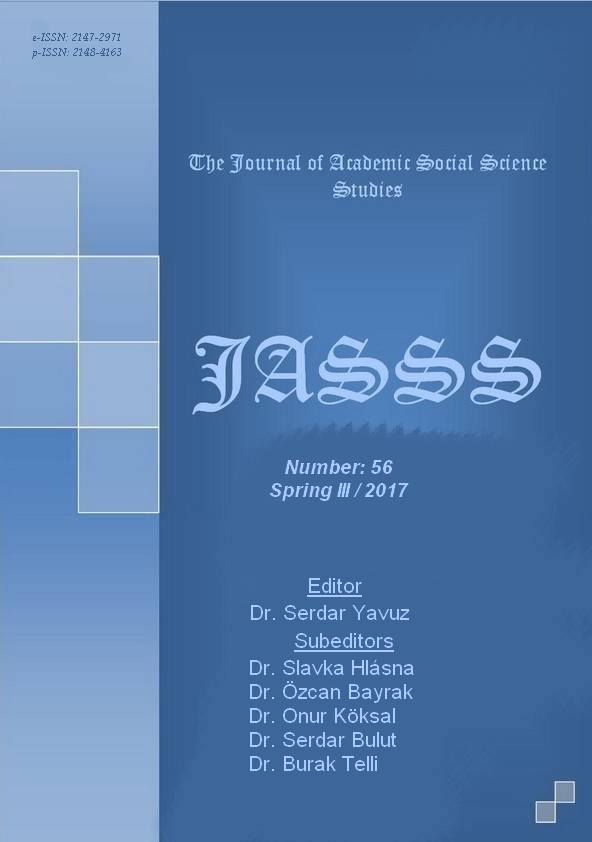Author :
Abstract
Bu çalışma, yaşam temelli öğrenme yaklaşımının ortaokul öğrencilerinin fen bilimlerine yönelik başarı ve motivasyonları üzerine etkisini araştırmayı amaçlamıştır. Araştırmanın uygulama basamağı 2015–2016 eğitim-öğretim yılında Çankırı ili merkezinde bulunan bir ortaokulun 6. sınıf öğrencileri üzerinde yürütülmüştür. Araştırmanın çalışma grubunda yer alan öğrencilerin sayısı toplam 50’dir. Araştırmanın örnekleme yöntemi amaçlı örneklemedir. Araştırmada deney ve kontrol gruplu yarı deneysel desen kullanılmıştır. Araştırma sırasında deney grubu öğrencilerine fen bilimleri dersinde 6. sınıf elektriğin iletimi ünitesi mevcut müfredatının yanı sıra yaşam temelli öğrenme yaklaşımına göre hazırlanan etkinlik ve etkinlik formları ders veren tarafından uygulanmıştır. Kontrol grubuna ise öğretim programının öngördüğü öğrenme yaklaşımlarına dayalı etkinlikler uygulanarak konular işlenmiştir. Dersler iki grupta da 6 hafta süresince aynı öğretmen tarafından yürütülmüştür. Araştırmada 6. sınıf Fen Bilimleri dersi Elektriğin İletimi ünitesinde yaşam temelli öğrenmenin etkilerini ölçmek için deney ve kontrol gruplarına “Elektriğin İletimi Ünitesine Yönelik Başarı Ölçeği” ve “Fen Bilimleri Dersi Motivasyon Ölçeği” uygulanmıştır. Araştırma sürecinin başında ve sonunda deney ve kontrol gruplarına veri toplama araçları uygulanmıştır ve araştırmadan elde edilen veriler SPSS paket programında değerlendirilmiştir. Araştırmanın sonucunda; mevcut müfredat içerisindeki yaklaşım ve uygulamaların kullanıldığı kontrol grubu ile bunlara ek olarak Yaşam temelli öğrenme yaklaşımlarının uygulandığı deney grubu öğrencilerinin, fen bilimleri dersinde işlenen elektriğin iletimi ünitesine yönelik akademik başarı puanları ortalamaları arasında başlangıçta bir fark yokken, uygulama sonucunda deney grubu lehine anlamlı bir fark bulunmuştur. Bunun yanı sıra yaşam temelli öğrenme yaklaşımının uygulandığı deney grubu öğrencileri ile kontrol grubu öğrencilerinin başlangıçta fen bilimleri dersine yönelik motivasyon düzeyleri eşit olduğu, buna rağmen uygulama sonunda yine deney grubu lehine bu eşitliğin bozulduğu görülmektedir.
Keywords
Abstract
This study aimed to investigate the effect of the context-based learning approach on the achievement and motivations of secondary school students towards science. Practice stage of the research was conducted on 6th grade students of a secondary school which is in Çankırı city center in 2015-2016 school years. Number of students that take place in the study group of the research is a total of 50. Sampling method of the research is purposive sampling. Experimental and control grouped quasi-experimental design is utilized in the research. In science lesson, besides the existing syllabus of 6th grade electrical conduction unit, activities prepared according to context-based learning approach and activity forms were also applied to the students of the experimental group by the teacher during the research. However, in the control group the subjects were handled by applying activities based on the learning approaches predicted by the curriculum. The lessons were carried out in both of the groups by the same teacher for 6 weeks. In the research “Achievement Scale for the Electrical Conduction unit” and “Motivation Scale for Science Lesson” was carried out on the ex perimental and control groups to measure the effects of context-based learning in the Electrical Conduction unit of 6th grade Science lesson. Data collection tools were applied to the experimental and control groups at the beginning and end of the research period and the data acquired from the research were evaluated in the SPSS packaged software. As a result of the research, although at the beginning there was no difference between the academic achievement point averages towards the electrical conduction unit handled in science lessons of students of the control group, in which approaches and practices of the existing curriculum were used, and the students of the experimental group, in which context-based learning approaches were applied in addition to these approaches and practices, at the end of the practice there was a significant difference in favor of the experimental group. In addition to this, it is seen that the motivation levels of the students of the experimental group towards science lesson, in which context-based learning approach was applied, and the control group were equal at the beginning, however; at the end of the practice it is seen that this equation is broken again in favor of the experimental group.





